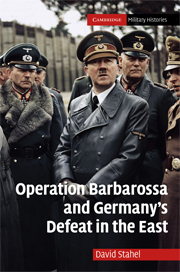Book contents
- Frontmatter
- Contents
- List of Illustrations
- List of Maps
- Acknowledgements
- Glossary of terms
- Tables of military ranks and army structures
- Introduction
- Part I Strategic plans and theoretical conceptions for war against the Soviet Union
- Part II The military campaign and the July/August crisis of 1941
- Conclusion
- Bibliography
- Index
- References
- Frontmatter
- Contents
- List of Illustrations
- List of Maps
- Acknowledgements
- Glossary of terms
- Tables of military ranks and army structures
- Introduction
- Part I Strategic plans and theoretical conceptions for war against the Soviet Union
- Part II The military campaign and the July/August crisis of 1941
- Conclusion
- Bibliography
- Index
- References
Summary
On 3 February 1941 Hitler hosted an important military conference in preparation for Operation Barbarossa – Nazi Germany's upcoming invasion of the Soviet Union. Although Hitler was determined to crush the Soviet Union in a short summer campaign, this was destined to become a titanic clash between two ruthless empires, leading to the largest and most costly war in human history. Hitler was sufficiently aware of the profound scale of the conflict and the momentous consequences it would induce, even in the shortened form that he conceived for it that by the end of the conference he ominously pronounced: ‘When Barbarossa begins the world will hold its breath.’ Nor was this just another bombastic outburst, typical of Hitler's unrestrained hubris. In a radio address on the day of the invasion (22 June 1941) the British Prime Minister, Winston Churchill, told his people:
So now this bloodthirsty guttersnipe must launch his mechanized armies upon new fields of slaughter, pillage and devastation…And even the carnage and ruin which his victory, should he gain it – though he's not gained it yet – will bring upon the Russian people, will itself be only a stepping stone to the attempt to plunge four or five hundred millions who live in China and the 350,000,000 who live in India into that bottomless pit of human degradation over which the diabolic emblem of the swastika flaunts itself. It is not too much to say here this pleasant summer evening that the lives and happiness of a thousand million additional human beings are now menaced with brutal Nazi violence. That is enough to make us hold our breath.
If the spectre of an expanding Nazi empire caused the world a sudden collective gasp, Churchill's words of defiance signalled Britain's determination to go on opposing Nazism and at the same time offered an open-ended alliance to the Soviet Union. It was an alliance born more of necessity than of pre-existing goodwill, for these were the darkest days of World War II. Nazi Germany had amassed the greatest invasion force in history. In the string of preceding campaigns the opposing nations of Europe had fallen in short order to German aggression, leaving the Soviet Union as the sole remaining continental power. With the planned conquest of Soviet territories, Hitler stood to gain immeasurable raw materials, freeing him forever from Britain's continental blockade and providing him with the strategic freedom to wage truly global warfare.
- Type
- Chapter
- Information
- Publisher: Cambridge University PressPrint publication year: 2009



